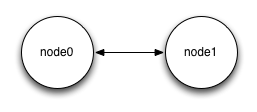| This document is derived from an original post by Tim Dysinger. That post is no longer available, but we have modified and restructured it, as well as making enhancments and corrections. Tim’s original code is on github, but we recommend using the examples here as they have a number of corrections. |
| If you want to use the experimental nng library instead, see the document Getting Started with 'nng'. |
Pair (Two Way Radio)

The pair pattern is used when there a one-to-one peer relationship. Only one peer may be connected to another peer at a time, but both may speak freely.
pair.c
#include <stdio.h>
#include <stdlib.h>
#include <string.h>
#include <unistd.h>
#include <nanomsg/nn.h>
#include <nanomsg/pair.h>
#define NODE0 "node0"
#define NODE1 "node1"
void
fatal(const char *func)
{
fprintf(stderr, "%s: %s\n", func, nn_strerror(nn_errno()));
exit(1);
}
int
send_name(int sock, const char *name)
{
printf("%s: SENDING \"%s\"\n", name, name);
int sz_n = strlen(name) + 1; // '\0' too
return (nn_send(sock, name, sz_n, 0));
}
int
recv_name(int sock, const char *name)
{
char *buf = NULL;
int result = nn_recv(sock, &buf, NN_MSG, 0);
if (result > 0) {
printf("%s: RECEIVED \"%s\"\n", name, buf); (1)
nn_freemsg(buf);
}
return (result);
}
int
send_recv(int sock, const char *name)
{
int to = 100;
if (nn_setsockopt(sock, NN_SOL_SOCKET, NN_RCVTIMEO, &to,
sizeof (to)) < 0) {
fatal("nn_setsockopt");
}
for (;;) {
recv_name(sock, name);
sleep(1);
send_name(sock, name);
}
}
int
node0(const char *url)
{
int sock;
if ((sock = nn_socket(AF_SP, NN_PAIR)) < 0) {
fatal("nn_socket");
}
if (nn_bind(sock, url) < 0) {
fatal("nn_bind");
}
return (send_recv(sock, NODE0));
}
int
node1(const char *url)
{
int sock;
if ((sock = nn_socket(AF_SP, NN_PAIR)) < 0) {
fatal("nn_socket");
}
if (nn_connect(sock, url) < 0) {
fatal("nn_connect");
}
return (send_recv(sock, NODE1));
}
int
main(const int argc, const char **argv)
{
if ((argc > 1) && (strcmp(NODE0, argv[1]) == 0))
return (node0(argv[2]));
if ((argc > 1) && (strcmp(NODE1, argv[1]) == 0))
return (node1(argv[2]));
fprintf(stderr, "Usage: pair %s|%s <URL> <ARG> ...\n", NODE0, NODE1);
return 1;
}| 1 | Blithely assumes message is ASCIIZ string. Real code should check it. |
Compilation
gcc pair.c -lnanomsg -o pairExecution
./pair node0 ipc:///tmp/pair.ipc & node0=$!
./pair node1 ipc:///tmp/pair.ipc & node1=$!
sleep 3
kill $node0 $node1Output
node0: SENDING "node0" node1: SENDING "node1" node1: RECEIVED"node0" node0: SENDING "node0" node0: RECEIVED"node1"
